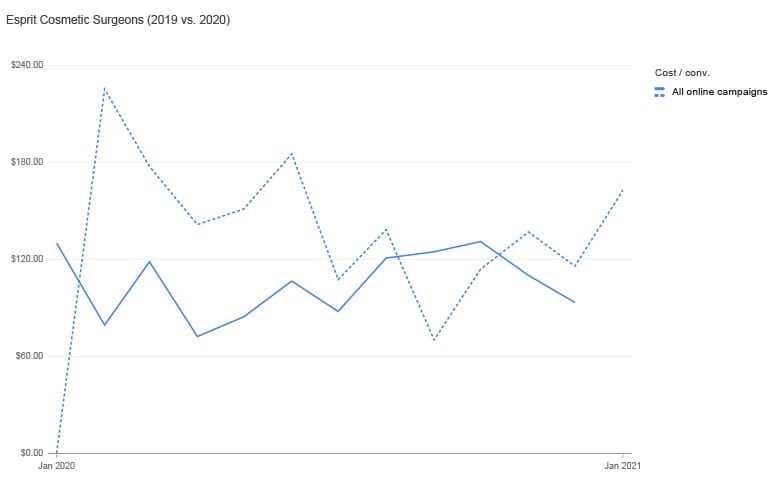As a medical practice, every dollar counts when it comes to effective marketing, and you want to ensure your strategy is on-point—especially with keyword targeting. There is a simple reality when seeking to attract patients in the lower funnel of their consumer journey, and that is that extensive research is needed to achieve results. If your goal is to generate more qualified leads online, then implementing a Google ads strategy that does not waste money is key.
But how do you do this?
At Firm Media, we approach Google ads by deploying a comprehensive strategy. We create ad verbiage that cuts through the noise, research the best keywords associated with what you want to accomplish, and look to identify the correct audience. Then, we formulate ads that connect emotionally and inspire trust—all in 90 characters or less.
If you are curious to learn how to use Google ads to generate qualified practice leads, consider the following best practices.
Never Continue Running a Google Ads Campaign that is Not Fully Optimized
As is the case with all digital advertising strategies, ensuring your campaigns are fully optimized will guarantee that you are targeting the right prospect at the right time with the right service—and this ups your chances of getting that prospect to walk through your practice’s doors.
To ensure your Google ads campaign is optimized, employ the following points:
Target keywords that are high-intent and efficient. For instance, instead of targeting “types of breast augmentation,” aim for phrases like “breast augmentation near me.” The latter could target a prospect who is further along in their buyer’s process and ready to decide.
Monitor ad copy effectiveness by analyzing your click-through rate. By assessing this percentage versus impressions, you understand the percentage of people who clicked on your ad after they were shown it. If the click-through rate is high, the copy is resonating.
Serve ads at the right time on the right schedule. When are your targeted patients searching for your services? During business hours? On the weekends? It is great to have a powerful ad, but if you are not delivering it at the right time, you are missing out. You must time target your ads when potential customers are searching and adjust your bidding strategy as such.
Measure and document ad leads to evaluate their quality. Seek to understand the action taken by a lead; for instance, did the lead call your practice ready to book a consultation? Or were they just calling to ask a research question? If you are seeing leads being reported, but they are not near the quality you need – you may need to re-evaluate your strategy.
Create Ad Copy That Inspires and Motivates
When your character count is limited, you must ensure that your ad copy is quickly persuasive. You can create an ad comprised of three headlines totaling 30 characters each. Here is how we approach it:
- Write ad copy that subscribes to the user’s intent or what they are aiming to achieve.
- Highlight what is important to the patient and strive for that emotional connection.
- Do not use language that could negatively impact how your practice’s services are perceived; for instance, avoid words like affordable, quick fix, low cost, and cheap. A patient is searching for a service to improve their life—and there is great value in that.
Engage in Effective Keyword Targeting—And Exclusions
The keywords used in your Google ads are not something you should “set and forget.” Engage in consistent keyword maintenance and evaluate their effectiveness and their results. If a keyword is not proving useful, then do not target it, so you do not waste money.
Here are some best practices:
- Target long-tail phrase-match and exact match keywords. By doing this, the risk is lowered for serving ads associated with irrelevant searches. For instance, instead of a broad match keyword for breast surgery try “best breast augmentation surgery.”
- Avoid wasting ad spend and clicks by adding irrelevant searches as “negative keywords.” This means, if the keyword has nothing to do with your practice or services, your ad will not be shown when a user searches for it. For instance, if your practice specializes in breast augmentation but not rhinoplasty, then rhinoplasty should be considered a negative keyword.
- Excluding research-based keywords will help ensure you are only advertising to patients who are further down the funnel and ready to commit. Again, you want to appeal to a patient who has made progress on their buyer’s journey and is ready to decide instead of an individual who just started preliminary research.
Test, Track, Monitor, and Repeat
On this last point, ensure you test ad group variants to maintain consistency between keywords and your ad copy. Here at Firm Media, we discovered that this helps achieve a decent quality score, which results in a less expensive CPC.
Next, confirm that every screw in your tracking plan is tightened. All data is useful and can paint a picture of ad quality, help with making future optimizations. Pay special attention to call tracking and recording, form tracking, and the like—these tools must work 100% of the time to help determine success.
Also, consider your Google ad campaigns through a microlens. Do not check in once a month. Rather, realize that much can happen in five days. Check on the type of conversions your campaigns are sending, as numbers can tell a different story than what your practice is actually bringing in. It is necessary to be aware and ready to act if your campaign is not performing. And if this the case, assess your keywords, look at ad timing, etc. If your ads still have a decent click-through rate of no less than 5%, check your budget and confirm it is sustainable.
Let Us Help You Capture Qualified Leads
To conclude, to get the most out of a Google ads campaign, you must be vigilant and aware. Live by the rule of “don’t set it and forget it.” Doing so is a waste of money and will not achieve results—all campaigns have expiration dates at some point.
This may seem like a lot to handle on your own while also running your practice and helping patients. If so, reach out to the team at Firm Media. We welcome the opportunity to consult with you, learn about your goals, and design a Google ads strategy tailored for you.
Contact us today.

